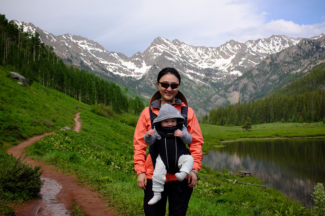Weiwei Li joined the Research Applications Laboratory at NCAR in 2018. She leads and contributes to multiple projects focused on assessing model physics performance to inform their improvements in a modeling/forecasting system. She is currently working on testing and evaluation of the physical parameterizations, involving two major modeling systems, i.e., the Unified Forecast System (UFS) and the Model for Prediction Across Scales (MPAS). Her team uses partially idealized simulations to isolate problematic areas in a given model, particularly the physics component, where most physical processes are parameterized. She compares simulated physical processes against reliable benchmarks, such as observations, to inform areas for improvement.
This is a good fit for Weiwei as she is a born investigator. She identified as an introvert as early as she can remember. She was fascinated by science books and mysteries. This fascination formed the basis for her love of all forms of investigations and challenges because they feed her passion for problem solving. Her original plan for her college study was either becoming a doctor or an archeologist. But somehow, she accidentally enrolled in the department of atmospheric sciences, not even realizing she actually submitted this in her college application. However, she learned to enjoy what she was studying. Because this field is very unique, she became fascinated by something entirely new instead of a subject she had preconceived notions about.
When asked how she describes her work to others, Weiwei explains that weather and climate models continue to suffer from systematic biases, many of which are related to missing or poorly represented physical processes and deficiencies in the underlying model physics. Process-based testing and evaluation of physics are essential for identifying and understanding the causes of model errors and biases, and to improve the overall performance of a weather/climate model, while ensuring that model adjustments or tunings can be justified on physical grounds. So, it is critical to conduct testing and evaluation of model physics components, their interactions, and the impact on the overall performance of a model, and using process-based testing and evaluation to advance understanding of physical processes.
The challenge of her work is also the most rewarding. Success requires deep teamwork, collaborations, and close coordination, all at a very fast pace. Another big challenge is knowing that one has to understand almost every aspect of a given model to distill and interpret information out of complicated processes in our Earth system to provide an objective evaluation of a modeling system.
When she isn’t assessing model performance, she’s juggling her work/life balance. Her daughter is entering kindergarten, and she tries to squeeze in some lap swimming. She’s a classical pianist, who’s also harboring a wish to play more jazz and occasionally plays duets with her daughter. She’s an avid reader of books about animals, culture, critical writing, traveling, and mysteries, of course. In addition to swimming, she loves yoga and barre (as she was a ballet student as a child). As fall approaches, she has a head full of home improvement and interior design ideas ready to go.
